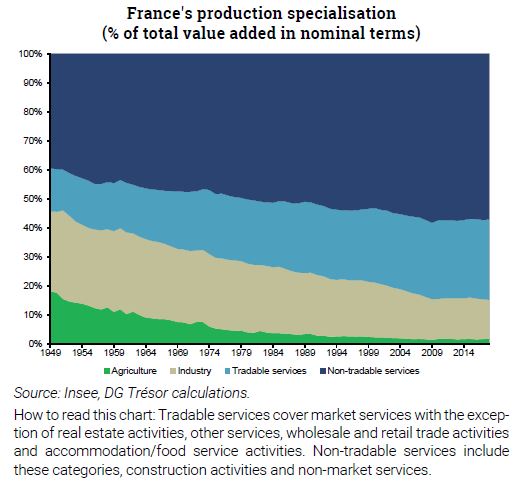Trésor-Economics No. 248 - Composition and competitiveness of the French economy
France's sectoral specialisation became distorted between 2006 and 2016: it is concentrated in high-tech industries and high value-added services; it is declining in the rest of the medium-tech industry. The evolution of productive specialisation in France mainly reflects the concentration of comparative advantages in promising activities such as aeronautics, tourism and business services.
The French economy's sectoral specialisation changed between 2006 and 2016. High-value added sectors emerged in both manufacturing (aeronautics, pharmaceuticals, chemicals) and services (R&D, finance, information and communication, corporate services). Conversely, the medium technology industry, primarily motor vehicles, electrical products and machinery and equipment, declined. However, in many cases including the automotive industry, these changes were accompanied by a significant rise in the ratio of turnover of foreign subsidiaries to overall turnover.
In a closed economy, production specialisation evolves according to preferences and productivity gains which vary across sectors. In an open economy, there are also external factors such as the economy's overall competitiveness, sectoral comparative advantages and businesses' internationalisation strategies. Changes to the tradable sector in France are essentially due to external factors.
Over the last decade, the recasting of the French tradable sector has mainly involved the concentration of comparative advantages on a reduced number of growth industries (aeronautics, tourism, corporate services) whilst previously strong industries have slumped (automotive, agri-food).
Sectoral shifts have economic, social and regional repercussions. Specialisation in strong value added professions buoys up growth and the expansion of personal services meets growing demand. But, this two-pronged trend polarises the labour market and thus heightens inequality.
Industry also remains one of the main drivers of productivity and its contraction can put a drag on potential growth. In addition, industry is spread out more evenly throughout France and is less concentrated in large metropolitan areas. Lastly, some industrial sectors help bolster France's technological independence.
Above and beyond the essential horizontal policies (investing in high-quality basic research, boosting the skillsets of the labour force, consolidating businesses' competitiveness, etc.), sectoral interventions may help address societal issues such as the ecological transition, technological advances or the aging population. The "Pacte Productif 2025" is in line with this approach and strives to marshal all available leverage to ensure that the production structure is able to cope with the challenges raised by the coming changes.
